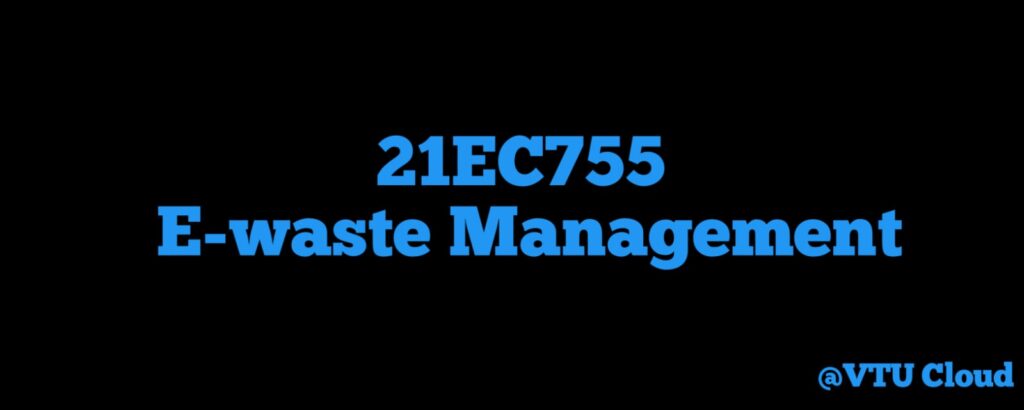21EC755 E-waste Management

Course Learning Objectives
● Current Status: According to a report on e-waste presented by the United Nations (UN) in World Economic Forum on January 24, 2019, the waste stream reached 48.5 MT in 2018. With such a large quantity of e-waste being generated each year, the future of e-waste recycling in India looks pretty bright. The E-waste (Management) Rules, 2016, enacted on October 1, 2017, added over 21 products (Schedule-I) under the purview of the rule.
● Purview: This course covers an extensive review of e-waste management in India. With a focus on the evolution of legal frameworks in India and the world, it presents impacts and outcomes; challenges and opportunities; and management strategies and practices to deal with e-waste. It also includes a survey of pan-India initiatives and trajectories of law-driven initiatives for effective e- waste management along with responses from industries and producers.
● Scope: There is a considerable scope for e-waste recycling in India. It is not only a solution to help mitigate e-waste management issues, but it also helps to generate employment. With the rise in e- waste recycling plants, the demand for employees with all levels of qualification and skills also increases.
SYLLABUS COPY
MODULE - 1
Sustainable development and e-waste management
Importance of electrical and electronic equipment in a nation’s development, and e-waste as toxic companion of digital era, I: Let’s understand e-waste, II: E-waste statistics: quantities, collection and recycling, E-waste categories and harmonising statistics, III: An overview on status of e-waste related legislation across the globe; IV: UN initiatives for e-waste management: creating partnerships and achieving Agenda 2030; V: Indian scenario: e-waste generation, collection and recycling.
MODULE - 2
Extended producer responsibility
a mainstay for e-waste management: Evolution of concept of ‘extended producer responsibility’, EPR applied for waste management and extended for e-waste management, EPR: goals, implementation, and challenges for e-waste management, EPR implemented for e-waste management under the existing regulatory frameworks in different countries, Role of a PRO prescribed in regulatory framework, Considerations for successful implementation of EPR, Challenges in implementation of EPR for e-waste management, Impact of EPR, EPR and e-waste management in India.
Toxicity and impacts on environment and human health
Toxicity, recycling, and regulations, I: Environmental concerns, II: Human health concerns.
MODULE - 3
Treating e-waste, resource efficiency, and circular economy
Safe environment, resource use, and circular economy, Circular economy: recycling, resource recovery, and resource efficiency, Potentials of urban mining in circular economy, Recycling and resource efficiency related challenges to the circular economy, Urban mining, recycling, resource use, resource efficiency, and circular economy in India.
E-waste management through legislations in India
I: Historical backdrop of regulatory regime for e-waste in India, II: E-waste (management) Rules, 2016 and E-waste (management) Amendment Rules, 2018, III: Analysing performance of EPR and CPCB as regulatory mechanisms, IV: Legal cases and judicial directives.
MODULE - 4
Strategies and initiatives for dealing with e-waste in India
I: Overview of pan-India initiatives for dealing with e-waste during 2000 and 2012, II: Law-driven e-waste management – initiatives by the government, non-government agencies, and judiciary.
MODULE - 5
Moving towards horizons
I: Legal and judicial domain, II: Economic concerns, III: Environment concerns, IV: Recycling culture/recycling society.
Course outcome
1. Understand the existing discourse on e-waste and its management, statistics across the world, opportunities, and challenges w.r.t. regulatory framework, SDGs, CE, and LCIA (Life Cycle Impact Assessment) and MFA (Material Flow Analysis), Indian scenario.
2. Describe EPR, a regulatory framework for achieving specified goals across different countries and impacts on environment and human health.
3. Explain themes in the context of resource use and sustainable development. Urban mining, informal sector operations and need for resource use policy, financial support for recycling infrastructure building, etc. in Indian context and also explain to what extent – different aspects of e-waste management have been incorporated in the existing regulatory framework in comparison with international legislatures.
4. Identify and infer pan-Indian initiatives dealing with e‑waste management, ranging from building knowledge base through research and social action by different stakeholders to technological and legal advancements, and industrial initiatives. Analyse roadmap for the Agenda 2030.
5. Use opportunities and challenges around four domains: legal and judicial domain; economic concerns; recycling culture/society; and environment concerns.
Suggested Learning Resources
Text Book
Varsha Bhagat Gangulay, ‘E-Waste Management’, Taylor and Francis, 2022.